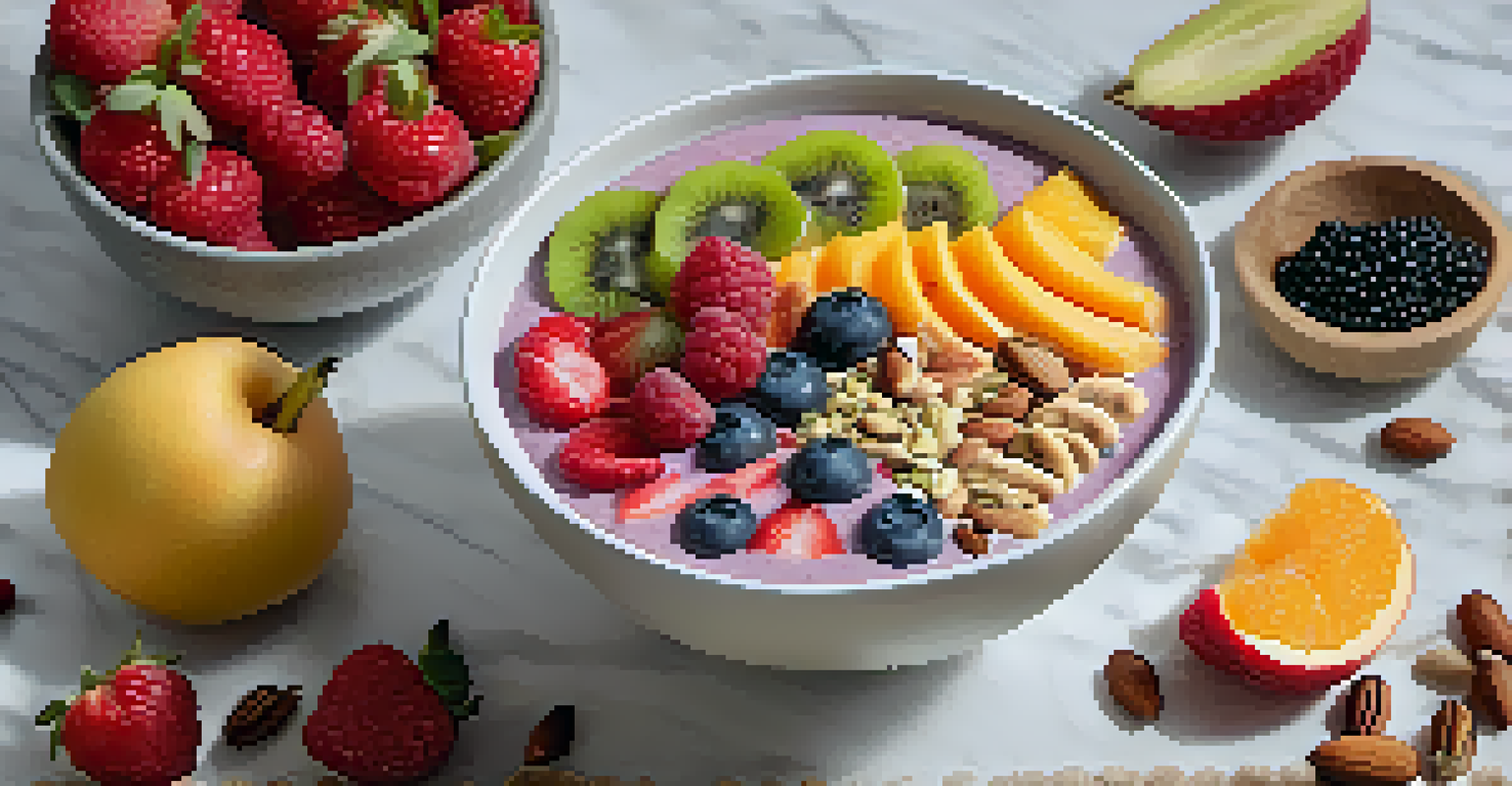Understanding the Raw Vegan Diet: Benefits and Challenges

What is a Raw Vegan Diet? An Overview
A raw vegan diet consists of unprocessed plant foods that are consumed in their natural state. This means everything from fruits and vegetables to nuts and seeds, all eaten raw. The goal is to maximize the intake of nutrients and enzymes that can be lost during cooking.
Let food be thy medicine and medicine be thy food.
Many people are drawn to this lifestyle for its emphasis on fresh, whole foods, which can be incredibly vibrant and flavorful. Think of it as a colorful palette of nature's bounty, ready to nourish your body. This diet also excludes animal products, making it a strict vegan approach.
The idea is that by avoiding heat processing, you preserve the food's natural goodness. So, if you're someone who loves crunchy salads and juicy fruits, you might find this diet particularly appealing.
Health Benefits of Raw Veganism
One of the most touted benefits of a raw vegan diet is weight management. Many raw vegan foods are low in calories but high in fiber, which can help you feel fuller longer without consuming too many calories. This makes it easier to maintain a healthy weight.

Additionally, raw vegan diets are rich in vitamins, minerals, and antioxidants. These nutrients can boost your immune system and promote overall health. Imagine loading your plate with vibrant fruits and veggies that are packed with these essential nutrients!
Nutritional Benefits of Raw Veganism
A raw vegan diet is rich in vitamins, minerals, and antioxidants, promoting weight management and increased energy levels.
Many adherents also report increased energy levels and improved digestion. The abundance of fresh, whole foods can fuel your body and support a healthy gut, making you feel lighter and more vibrant.
Potential Nutritional Deficiencies
While a raw vegan diet has many benefits, it can also lead to nutritional deficiencies if not carefully planned. For example, vitamins B12 and D, as well as omega-3 fatty acids, are often lacking in this diet. These nutrients are crucial for energy production and brain health.
The food you eat can be either the safest and most powerful form of medicine or the slowest form of poison.
It’s important to be mindful of your nutrient intake. Some raw vegans may need to consider supplements to make sure they are meeting their dietary needs. Think of it as being a little like a puzzle; if you’re missing key pieces, the picture won’t be complete.
Consulting with a healthcare professional or a registered dietitian can help you navigate these potential pitfalls. They can guide you in crafting a balanced meal plan that meets your nutritional needs.
Challenges of Adopting a Raw Vegan Diet
Transitioning to a raw vegan diet can be quite challenging. Many people find it difficult to give up cooked foods, especially if they are used to warm meals and comfort foods. This transition may require a significant shift in mindset and habits.
Social situations can also pose challenges. Dining out or attending gatherings may become tricky, as many restaurants don’t offer raw vegan options. It can sometimes feel isolating, as you might find yourself preparing separate meals.
Challenges of Raw Vegan Transition
Adopting a raw vegan diet can be difficult due to the need to give up cooked foods and the extensive meal preparation required.
Moreover, the preparation time can be extensive. Raw meals often require washing, chopping, and marinating, which can be time-consuming. This can deter busy individuals from sticking with the lifestyle.
Raw Vegan Recipes to Try
If you’re curious about trying a raw vegan diet, starting with some simple recipes can be a great way to ease into it. Consider a refreshing raw zucchini noodle salad tossed with a homemade cashew cream dressing. It’s delicious and satisfying!
Another easy recipe is a raw fruit smoothie bowl, topped with your favorite nuts and seeds. This not only tastes great but also provides a nutritious breakfast option to kickstart your day. The blend of flavors and textures can make raw eating exciting.
Don't forget about raw desserts! Energy balls made from nuts, dates, and cocoa powder can satisfy your sweet tooth without compromising your diet. These treats are perfect for an afternoon snack or a healthy dessert.
The Environmental Impact of Raw Veganism
Adopting a raw vegan diet can also have positive environmental benefits. Plant-based diets generally require less water and land compared to meat-based diets, making them a more sustainable choice. By choosing raw and unprocessed foods, you're not only nourishing your body but also caring for the planet.
Moreover, many raw vegans prioritize organic and local produce, which further reduces their carbon footprint. Eating seasonally and supporting local farmers can create a more eco-friendly food system. It’s like voting with your fork for a healthier planet.
Environmental Impact of Raw Veganism
Choosing a raw vegan lifestyle can positively affect the environment by reducing water and land use compared to meat-based diets.
However, it's important to consider the sourcing of your produce. Transporting exotic fruits long distances can offset some of the environmental benefits. So, being mindful of where your food comes from can enhance your impact.
Is the Raw Vegan Diet Right for You?
Deciding whether the raw vegan diet is right for you involves self-reflection and understanding your body’s needs. It’s essential to consider your lifestyle, health goals, and any pre-existing conditions you may have. Everyone’s journey to health is unique.
If you thrive on fresh fruits and vegetables and are willing to explore new culinary techniques, you might find this diet rewarding. However, if you struggle with food variety or have specific nutritional needs, a more balanced approach may be best.

Ultimately, the key is to listen to your body and adjust your diet to suit your individual preferences and requirements. A balanced approach that includes a variety of food types can lead to long-term success and satisfaction.